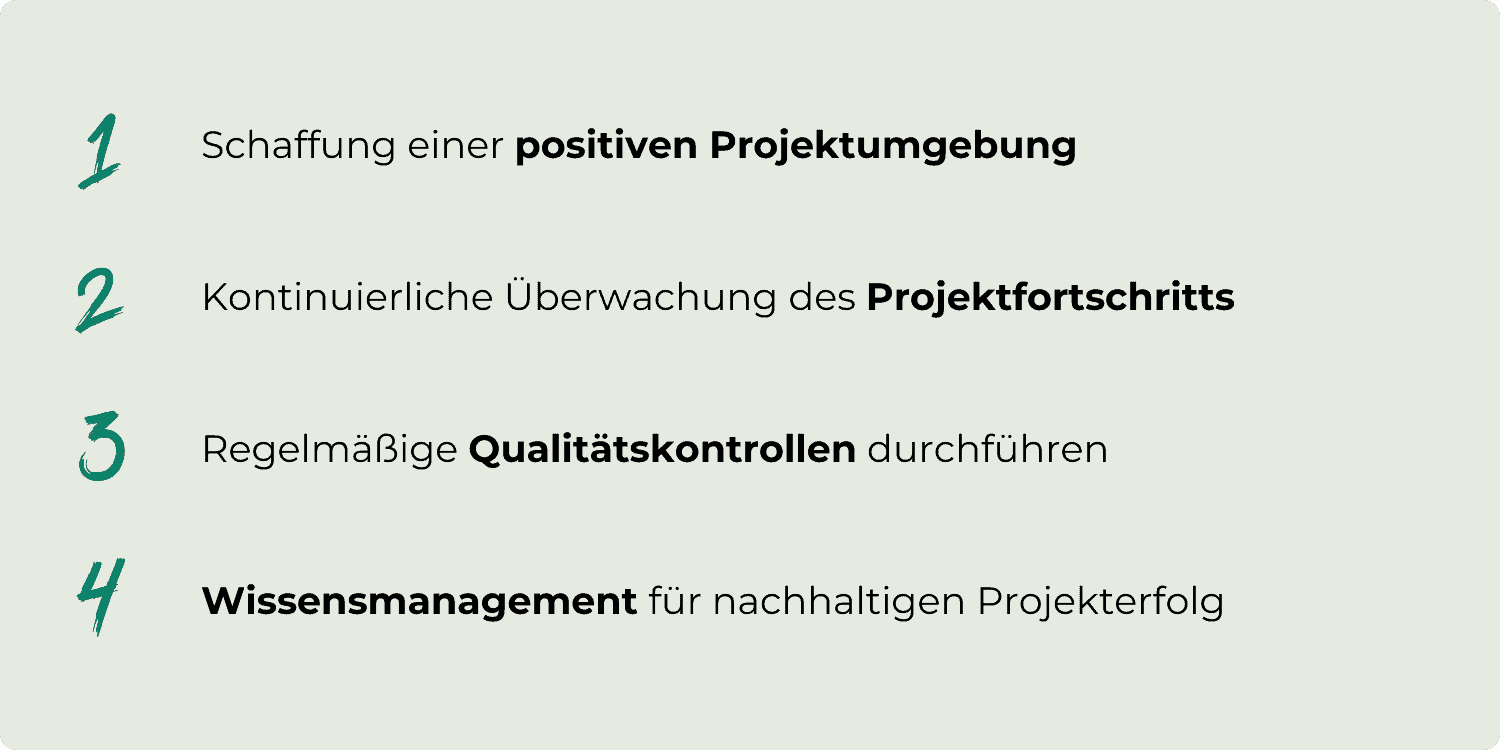
Die Sicherung des Projekterfolgs ist entscheidend für den Gesamterfolg Ihres Unternehmens. Ein reibungsloser Projektabschluss gewährleistet die Zielerreichung und die Zufriedenheit Ihrer Kunden. Gelingt ein Projekt, so hängt dieser Erfolg von verschiedenen Faktoren ab, die sorgfältig berücksichtigt werden müssen. Hierzu zählen essenzielle Aspekte wie effektives Zeitmanagement, optimale Nutzung Ihrer Ressourcen und klare Zielsetzungen. Ebenso spielen Kostenkontrolle und Risikomanagement eine bedeutende Rolle bei der Realisierung Ihrer Projektziele.
As a project manager, you should be able to motivate your entire team and sämtliche Stakeholder miteinzubeziehen. Wie Sie in der Praxis Ihren Projekterfolg sichern, erfahren Sie in diesem Blog. Wir geben Ihnen praktische Tipps und widmen uns den entscheidenden Erfolgsfaktoren für Ihre Projekte.
At Gabler Wirtschaftslexikon becomes a success as
„das i.d.R. in monetären Größen erfasste bzw. ausgedrückte Ergebnis des Wirtschaftens; ermittelt durch Erfolgsrechnung“
definiert. Projekterfolg bezeichnet demnach im Allgemeinen den erfolgreichen Abschluss eines Projekts, wenn die vordefinierten Ziele und Anforderungen innerhalb des festgesetzten Zeitrahmens, Budgets und unter Einhaltung der Qualitätsstandards erreicht wurden. Effektive Kommunikation, Teamwork und die Erfüllung der Kundenanforderungen sind dabei entscheidende Faktoren. Die Messung des Projekterfolgs geschieht oft anhand der Gesamtleistung und dem Mehrwert für die Stakeholder.
Unternehmen streben in der Regel danach, den Wert des Unternehmens zu steigern oder zu verbessern, obwohl dies nicht zwangsläufig bei jedem Projekt der Fall sein muss. Für jedes Projekt sollten Sie sich also folgende grundlegende Fragen stellen:
• Welchen Beitrag soll das Projekt für das Unternehmen leisten?
• Erreicht das Projekt den erwarteten Mehrwert?
• Sind alle Interessensgruppen des Projektes zufrieden?
In German-speaking countries in particular, the so-called magic triangle ein gängiges Symbol für drei essenzielle Faktoren im Projektmanagement bekannt. Diese Faktoren umfassen Zeit, Kosten und Leistung. Der Fokus oder Erfolgsfaktor befindet sich dabei zentral in der Mitte des Dreiecks. Änderungen an einer der Variablen erfordern entsprechende Anpassungen an den übrigen beiden, um die Integrität des Dreiecks zu wahren. Ihre Aufgabe als Projektmanager besteht darin, die drei Eckpunkte des magischen Dreiecks in Einklang zu bringen, um die bestmögliche Qualität zu gewährleisten und gleichzeitig Budget, Fristen und Projektspezifikationen einzuhalten.

Time: Diese Dimension bezieht sich auf die Zeitplanung und beeinflusst die Abstimmung der beiden anderen Werte. Zeit steht nicht nur für den Start und das Enddatum Ihres Projektes, sondern auch für Intermediate goals or significant milestones.
Costs: Die Kosten-Dimension quantifiziert die finanziellen Aufwendungen und das verfügbare Budget für Ihr gesamtes Projekt. Ein vor Projektbeginn festgelegtes Budget sollte nicht überschritten werden, um wirtschaftliche Projektführung zu gewährleisten.
Performance: The performance dimension summarises the desired results that should be achieved upon completion of your project. The goals should gemäß SMART-Formel strukturiert sein und vor Projektbeginn mit allen Beteiligten, Entscheidungsträgern und Stakeholdern abgestimmt werden.
Bei Veränderungen der Faktoren entstehen verschiedene Zielkonflikte. Oftmals sind Kundenzufriedenheit und unzureichende Ressourcenplanung die Ursachen für diese Konflikte. Wenn sich die Anforderungen von Kunden, Auftraggebern oder Stakeholdern ändern oder eine Dimension aus dem Gleichgewicht gerät, können folgende Konflikte auftreten:
Cost vs. time: Eine vorgezogene Deadline kann Überstunden oder die Einstellung zusätzlichen Personals erfordern, was wiederum die Kosten erhöht.
Performance vs. time: Wenn die gewünschte Leistung nicht erbracht werden kann, muss entweder die Deadline ausgeweitet oder die Kosten für zusätzliches Personal erhöht werden.
Cost vs. performance: Bei reduziertem Budget müssen auch Zeit und Leistung entsprechend angepasst werden. Nur so können Sie wirtschaftlich agieren.
Die unterstreicht die grundlegende Verbindung dieser Faktoren. Änderungen an einer der Ecken des Dreiecks haben unmittelbaren Einfluss auf die anderen Ecken. Planen Sie daher für alle Werte entsprechende Puffer ein, um die Beziehung und das Dreieck intakt zu halten. Wichtig: Klären Sie alle Faktoren vor Projektbeginn! Ein präzise ausgearbeiteter Projektplan ermöglicht Ihnen, das Dreieck ausgewogen zu halten.
The relevance of the magic triangle is also emphasised by the Studie „Makroökonomische Vermessung der Projekttätigkeit in Deutschland“ der GPM Deutsche Gesellschaft für Projektmanagement unterstrichen. Eine differenzierte Betrachtung zeigte, dass Projekte hauptsächlich in Bezug auf Qualität, Kosten und Zeiteinhaltung als erfolgreich betrachtet werden.
Das magische Dreieck beinhaltet jedoch bei weitem nicht alle Erfolgsfaktoren für Ihre Projekte. Denn: Die Association for Projekt Management (APM) fand 2021 in ihrer Studie „Conditions for project success” heraus, dass lediglich 22 Prozent aller Projekte als erfolgreich betrachtet werden. Befragt wurden hierzu 850 Projektverantwortliche aus Wirtschaft und öffentlichem Sektor in Großbritannnien. Die Befragten identifizierten dabei fünf entscheidende Faktoren für den Projekterfolg:
1. planning: Die Vorplanung des Projekts ist umfassend und sorgfältig durchdacht; es erfolgt regelmäßiges und gründliches Fortschrittsmonitoring. Das Projekt beinhaltet realistische Zeitpläne, aktives Risikomanagement sowie eine nachgelagerte Projektüberprüfung.
2. team composition: Erfahrene Fachkräfte, die ein Projektkernteam bilden, verfügen über umfassende Kompetenzen. Auch andere Teammitglieder sind vollständig kompetent und zeigen konstruktive Verhaltensweisen, die den Projekterfolg fördern.
3. target definition: Das übergeordnete Ziel des Projektes ist deutlich spezifiziert und wird von allen Stakeholdern anerkannt. Es steht nicht im Konflikt mit untergeordneten Zielen. Die Projektleiter haben eine klare Vision der Projektergebnisse.
4. governance: Im Projekt sind die Führungspersonen, Verantwortlichkeiten, Berichtswege und die Kommunikation zwischen allen Beteiligten eindeutig festgelegt.
5. will to succeed: All project stakeholders are and remain committed to the success of the project. Any lack of commitment is recognised and addressed, with the project management inspiring others to get involved.
Die Studienergebnisse zeigen, dass es das vorrangige Ziel ist, die Wichtigkeit eines professionellen Projektmanagements für Projektleiter zu unterstreichen. Die Ergebnisse sind jedoch für jeden von Relevanz, der am erfolgreichen Abschluss von Projekten interessiert oder beteiligt ist. Doch was können Sie als Projektmanager aktiv tun, damit Ihre Projekte auch den gewünschten Erfolg erzielen?
As a project manager, you know that every project has pitfalls and challenges. To help you face them calmly, we give you four practical tips for achieving successful results:

Eine positive Projektumgebung spielt eine entscheidende Rolle für Ihren Projekterfolg. Achten Sie darauf, dass Ressourcen effektiv eingesetzt werden, indem Sie Priorisierung, Delegation und Optimierung der Arbeitsabläufe nutzen, um Zeit- und Kostenfaktoren zu minimieren. Der Erfolg Ihres Projektes hängt aber nicht nur von Ressourcen und Zeit ab, sondern auch von einem motivierten Projektteam. Motivate your team und fördern Sie die Zusammenarbeit durch Anerkennung. Dies kann sowohl durch verbale Lobesworte als auch durch kleine Belohnungen erfolgen. Durch die Anerkennung der individuellen Stärken und Leistungen jedes Teammitglieds fühlen sich Ihre Mitarbeiter geschätzt und vor allem gesehen.
Es ist jedoch nicht nur das individuelle Lob wichtig, sondern auch die Förderung einer positiven Gruppendynamik. Teambuilding-Aktivitäten und regelmäßige Meetings können dazu beitragen, dass Ihr Team sich besser kennt und ein Gefühl von Zusammengehörigkeit entwickelt. Letztlich arbeitet Ihr Team gemeinsam auf ein Ziel hin: den erfolgreichen Abschluss des Projektes. Wenn Sie ein Projekt erfolgreich beendet haben – besonders, wenn es ein langwieriges und komplexes Projekt für alle Beteiligten war – dann bleibt Ihnen und Ihrem Team nur noch eines zu tun: Feiern Sie den Projekterfolg! Das steigert die Motivation für ähnliche Vorhaben in der Zukunft und trägt zu einer positiven Arbeitsumgebung bei.
Um Ihren Projekterfolg sicherzustellen, sollten Sie kontinuierlich den Fortschritt des Projektes im Blick behalten. Legen Sie konkrete Kriterien und Messgrößen fest, um den Projektfortschritt genau zu verfolgen und bei Bedarf Anpassungen vorzunehmen, um das Ziel termingerecht und innerhalb des Budgets zu erreichen. Benchmarking ermöglicht Ihnen darüber hinaus auch einen Vergleich mit anderen ähnlichen Projekten oder Unternehmen, um Stärken und Schwächen zu identifizieren und erfolgreiche Praktiken anzuwenden. So maximieren Sie die Erfolgsfaktoren.
Ein wichtiger Teil des Projektmanagements ist auch die frühzeitige Identifizierung von Risiken, um mögliche Probleme zu erkennen und ihnen vorzubeugen. Ein Frühwarnsystem kann dabei helfen, diese Risiken schnell zu erkennen, bevor sie zu größeren Schwierigkeiten werden. Durch die Implementierung einer geeigneten Software wie ZEP können Sie sicherstellen, dass Ihr Team auf dem richtigen Weg bleibt. So behalten Sie jederzeit den Überblick, ohne dass Hindernisse Ihren Projekterfolg gefährden. Eine kontinuierliche Überwachung des Projektfortschritts ermöglicht es Ihnen, Veränderungen zu erfassen und schnell darauf zu reagieren. Durch eine proaktive Herangehensweise an potenzielle Risiken können Sie Zeit und Kosten sparen und sicherstellen, dass Ihr Projekt erfolgreich wird.
Ein weiterer wichtiger Faktor für Ihren Projekterfolg ist die Durchführung regelmäßiger Qualitätskontrollen. Damit stellen Sie sicher, dass alle definierten Kriterien und Standards eingehalten werden und Sie Ihre Projektziele erreichen. Hierfür legen Sie entsprechende Standards und Prüfverfahren fest und wenden diese konsequent an. Durch die systematische Überprüfung können Sie nicht nur mögliche Fehler frühzeitig erkennen, sondern auch Optimierungspotenziale aufdecken. Eine erfolgreiche Qualitätskontrolle kann zudem dazu beitragen, Kosten zu sparen und Ressourcen effizienter einzusetzen.
Ein gut funktionierendes Team sowie klare Kommunikationswege sind hierbei ebenso wichtig wie ein kontinuierliches Monitoring Ihres Projektes. Daher ist es ratsam, gezielte Maßnahmen zur Qualitätssicherung zu ergreifen, um einen wesentlichen Beitrag zum erfolgreichen Abschluss Ihrer Projekte zu leisten. So stellen Sie sicher, dass Ihr Projekt den definierten Qualitätsstandards entspricht und erfolgreich abgeschlossen werden kann.
Ein entscheidender Erfolgsfaktor für Projekte liegt im systematischen Erfassen von Erfahrungen aus vergangenen Projekten. Das Dokumentieren von Wissen und bewährten Methoden kann dazu beitragen, zukünftige Projekte erfolgreicher zu gestalten. Dabei geht es nicht nur um die Aufzeichnung von Fehlern und Problemen, sondern auch um die Identification of success criteria und bewährten Methoden. Ein effektives Wissensmanagement ermöglicht es Ihnen, schneller auf Herausforderungen zu reagieren und Ressourcen sowie Zeit und Kosten effizienter einzusetzen. Auch Ihre Kunden profitieren davon, da sie qualitativ hochwertige Ergebnisse erhalten und sich Ihr Unternehmen als verlässlicher Partner präsentiert. Durch kontinuierliches Lernen aus vergangenen erfolgreichen Projekten können Sie Ihr Projektmanagement stetig verbessern und langfristigen Erfolg sicherstellen.
Ein weiterer wichtiger Faktor, um den Projekterfolg zu sichern, ist der Wissenstransfer. Hierbei können Schulungen und Mentoring-Programme helfen, das Know-how innerhalb Ihres Teams zu teilen und zu erweitern. Durch gezielte Trainingsmaßnahmen können Ihre Mitarbeiter auf neue Herausforderungen vorbereitet werden und ihr Wissen auf den aktuellen Stand bringen. Ein Mentor-Programm kann ebenfalls dazu beitragen, Erfahrungen und Wissen im Unternehmen weiterzugeben. Dies fördert nicht nur die persönliche Weiterentwicklung der Mitarbeiter sowie einen stärkeren Zusammenhalt im Team, sondern auch die Qualität der Arbeitsergebnisse im Projekt.
Um einen erfolgreichen Wissenstransfer zu gewährleisten, sollten diese Maßnahmen frühzeitig geplant und durchgeführt werden. Dabei sollten Sie stets die Kosten und Ressourcen im Blick behalten. Eine klare Definition von Kriterien für Schulungen sowie eine regelmäßige Überprüfung des Erfolgs dieser Maßnahmen sind entscheidend für Ihren langfristigen Projekterfolg. Durch effektives Wissensmanagement kann Ihr Team schneller auf Veränderungen reagieren und somit das Projektziel schneller erreichen.
Für ein effektives Projektmanagement spielt die Recording of working time eine entscheidende Rolle. Dies gelingt jedoch nur, wenn alle Teammitglieder an einem Strang ziehen. Klar definierte Richtlinien und eine transparente Kommunikation über Ihre Erwartungen sind die ersten Schritte hin zu einer durchgängigen Projektzeiterfassung. Denn: Neben der reinen Anwesenheitszeit ist es für Ihren Projekterfolg entscheidend, sowohl anstehende als auch erledigte Aufgaben zu dokumentieren. Dies kommt Ihrem gesamten Projektteam zugute, da alle Beteiligten den Projektfortschritt nachvollziehen können, anstehende Schritte kennen und die Verantwortlichkeiten klar kommuniziert und dokumentiert sind.
Dies steigert die Transparenz innerhalb Ihres Teams und fördert das Vertrauen in die korrekte Arbeitszeiterfassung. Zusätzlich wirken sich regelmäßige Statusmeldungen zu den Projektzeiten motivierend auf den Erfolg des Projektes aus. Angesichts der Vielschichtigkeit von Projekten und den damit verbundenen Herausforderungen werden Softwares zur Projektzeiterfassung – wie ZEP – immer wichtiger für Ihren Projekterfolg. ZEP sorgt nicht nur für Transparenz bei Anwesenheitszeiten, Arbeitsschritten und Erfolgen, sondern unterstützt Sie auch effektiv bei der Budgetplanung und -einhaltung. Damit wird die Software zu einem unverzichtbaren Werkzeug im Projektmanagement und damit auch für Ihren Projekterfolg.


Read article ↗

How can you strengthen your employer brand and attract the best talent? Discover 11 effective employer branding measures that will help you stand out from the competition and optimise your recruitment strategy.
Read article ↗
We answer your questions quickly & competently. Contact us by phone or email.
+49 7156 43623-0 or contact form